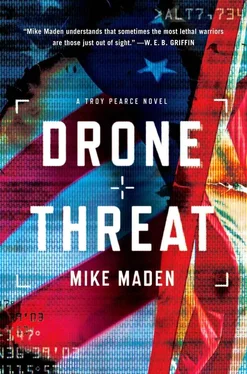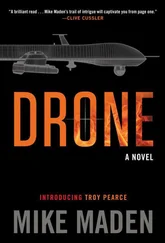“That concerns me.”
Pearce nodded. “It should. But like I said, I won’t bullshit you.”
Earlywine’s face soured. “Decorum, Mr. Pearce.”
“Sorry, ma’am.”
“Apology accepted.” She turned to the chairman. “I stepped in front of you. Please, have at it.”
Floyd cleared his throat, then launched into his inquiry. Just as Grafton had predicted, he began by asking Pearce what Drone Command was supposed to be. Pearce gave Floyd the answer he’d rehearsed with her, only adding that Drone Command would be like a more focused, pared-down version of DARPA combined with the U.S. Transportation Command (TRANSCOM). He summed it up neatly. “We find new drone systems, acquire them, and on occasion, deploy them.”
Not entirely satisfied, Floyd pressed further, wanting to know more details about organizational structure, personnel administration, and other particulars that Grafton had again warned him about. Being a quick study, Pearce threw him the answer that Grafton had fed him the day before. “I’d refer you to the appropriate addenda included in the report I sent over to your office.”
“Not a detail man, eh?” Floyd said.
“I’m a delegator. I leave the details to those best suited to handle them.”
Floyd scratched one of his bushy eyebrows with a thumbnail. “Then let me cut to the chase. I’m still trying to wrap my mind around the whole reason for this new federal bureaucracy. President Lane insists on holding the line with the budget freeze that’s been in place since the Myers administration. Seems to me we should be cutting departments, not adding them.”
“In both the short and long run, Drone Command will save you money.”
“How?”
“By trusting the private sector to do what it does best — create and innovate. The Pentagon’s weapons procurement system is just a glorified version of Soviet central planning. The technology is galloping ahead too far and too fast for bureaucrats to keep pace with.”
“Are you denying the fact we have the most powerful and technologically advanced military on the planet?” Floyd asked.
“No. But the systems we acquire are often over budget, off schedule, buggy, and behind the technology curve the day they’re deployed. The Pentagon only knows what it knows, so it keeps acquiring weapons systems for battles it plans on fighting. The problem is, it never does fight those wars — and every war we lose is to technologically inferior opponents. We haven’t fought a carrier duel since the Battle of Leyte Gulf in 1944, but we’re building three thirteen-billion-dollar Ford -class aircraft carriers to add to our fleet of ten Nimitz -class carriers. Currently the Russians have one carrier. Same with the Chinese.” Pearce’s voice trailed off. “At least, until recently.” He was suddenly distracted by the memory.
Earlywine nodded gravely. “A terrible tragedy.”
“My older brother was killed at the Chosin Reservoir. I’m not losing any sleep over it,” Floyd said.
“You’re suggesting we have too many carriers, Mr. Pearce?” Kelly asked.
The question snapped Pearce back to reality. “Not my department, sir. But I do know that both the Russians and the Chinese are pursuing hypersonic ‘carrier-killer’ missile programs, each at a fraction of the cost of a single American aircraft carrier. And such missiles are, technically, drones.”
“But wouldn’t you agree that our military technology, including carrier technology, is key to our continued military dominance?” Floyd asked. “Just look at the F-35. It’s the world’s finest air-superiority fighter.”
“We’re all familiar with the F-35 budget boondoggle and the ongoing technical problems it suffers, including the bugs that kill our pilots. We also know some of that technology has been hacked by Chinese cyberwarfare. The only problem with building an overly expensive and underperforming air-superiority fighter is that we haven’t fought an air-superiority engagement in over twenty-five years. No disrespect to anyone in the room or in this building, but we’re going to lose the next war because we’re spending too much money on the wrong systems for the wrong battles for the wrong reasons.”
“And what would those reasons be?” Kelly asked.
“The fact that the F-35 Lightning is manufactured in forty-five states and Puerto Rico tells me a lot about the procurement process.”
“Like what, Mr. Pearce?”
“Defense procurement is more about securing votes back home than it is about acquiring the best weapons systems at the least expense.”
“That’s quite an indictment of the people in this room and in this building, Mr. Pearce.”
Pearce glanced over at Grafton. Her frozen smile and desperate eyes told him to stand down. He thought about everything that Chandler and Grafton had warned him about. But he couldn’t play the game. “I suppose it is,” Pearce said. “Respectfully.”
“And your little department is going to right the ship?”
“We’re going to give it one helluva try, at least as far as drone technologies go.”
Senator Kelly broke in. “No offense, Mr. Pearce, but you’re just one man with considerable but still limited experience with drone operations. What makes you think you’re more qualified or better at predicting the future than the Pentagon in these matters?”
“I’m not. Not at all. I have no idea what the next war will look like. Maybe it will be a carrier duel in the Pacific or the Battle of Britain 2.0. But nobody knows because nobody can predict the future, including the Pentagon. That’s why it’s better to let the technology determine the path forward rather than for any of us to try and guess the future.”
“The Pentagon has been rushing headlong into drone development. Why do they need you and this new department?”
“The Pentagon has a bad record regarding drones. The basic technology is from the nineteenth century — the first patent for what we would call a drone was issued to Nikola Tesla back in 1898. The Pentagon — especially the air force and other flying services — fought like hell to ignore it for decades. It was the CIA that finally shoved their noses into the technology when the air force couldn’t provide needed surveillance over Bosnia in the early 1990s during our air campaign against the Serbs. It was only after civilians had developed the technology and pumped live video images of enemy combatants to commanders in the field and back in the Pentagon that the Predator’s extreme value became understood. In other words, the Pentagon often doesn’t know what’s possible. My job is to show them what’s possible and then let them decide how they might want to use it without the technology getting sidetracked by the lobbyists and log rollers. National security shouldn’t be sold to the highest bidder.”
Kelly shook his bald head. “I’m the Pentagon’s number one fan up here. I think our men and women in uniform do an amazing job defending this country, day in and day out.”
Pearce swore Kelly was looking for a camera to bloviate into while he was delivering his campaign speech. He kept his temper in check. “I support the troops as well, Senator. It’s the waste, fraud, and abuse of the Pentagon procurement system I question.” Pearce wanted to tell the old bastard off. Too many retired congressmen landed on the corporate boards of big defense contractors or as partners in big K Street lobbying firms after spending their congressional careers bloating the defense budget on behalf of their future employers. But President Lane deserved better than him flying off the handle.
“My state is home to some of the nation’s finest defense contractors. I’m one of those old-fashioned people who happen to believe that national security wouldn’t be possible without them,” Earlywine said.
Читать дальше












